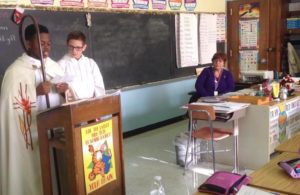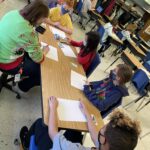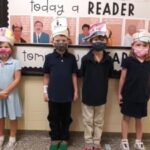Diocesan Curriculum
Faith
 Our Catholic identity is the foundation of everything we do; it frames how we communicate with one another and our entire curriculum. It is the most important aspect of our school community. Our program contains a balance of doctrinal content, scriptural understanding, faith formation, prayer and worship experiences.
Our Catholic identity is the foundation of everything we do; it frames how we communicate with one another and our entire curriculum. It is the most important aspect of our school community. Our program contains a balance of doctrinal content, scriptural understanding, faith formation, prayer and worship experiences.
In addition to scheduled class time for religious education, our students participate in daily prayer at the start and conclusion of the school day and lunch, weekly Mass, the Sacrament of Reconciliation, Stations of the Cross, and service opportunities throughout the school year.
Technology
The Department for Catholic Schools views technology as a way to foster communication, analysis, research and understanding – to help students manifest the four components of the ministry of education: message, community, worship, and service in their daily lives. Always, the teacher in a Catholic school must permeate content and process with Christian values. The sacredness of all life, the establishment of peace in the world, the never-ending work for justice and the responsibility to be co-creators in the continuing progress of humanity are the primary goals of technology education in the Diocese of Pittsburgh.
In a Catholic school, all goals are accomplished in the context of the Catholic philosophy of education. Here technology is recognized as the Wisdom of God in creation and must be directed to the benefit of humankind for the fulfillment of God’s plan for the world.
Computer Curriculum Overview
The current computer curriculum is built around a scope and sequence of 500 learning objectives in ten key technology areas that meet or exceed Pennsylvania and International Society for Technology (ISTE) NETS standards. By design, each lesson builds upon the technology skills, the learning objectives, and the content knowledge taught in preceding lessons. When the curriculum is implemented sequentially, the students have opportunities to practice, and over time, to achieve mastery of the skills in all ten technology areas.
- Operating Environments
- Spreadsheets
- Internet
- Programming
- Applied Technology
- Databases
- Graphics
- Multimedia
- Desktop Publishing
- Word Processing
Fine Arts
 The Fine Arts are an important entity in contemporary society. A Fine Arts program is vital so that students from Kindergarten through twelfth grade can understand this important facet of their world. It will provide students with the opportunity to deepen their awareness of God’s gift of creation and to respond creatively to the beauty and goodness of the world. Through music and art, values and needs of individuals are revealed and savored.
The Fine Arts are an important entity in contemporary society. A Fine Arts program is vital so that students from Kindergarten through twelfth grade can understand this important facet of their world. It will provide students with the opportunity to deepen their awareness of God’s gift of creation and to respond creatively to the beauty and goodness of the world. Through music and art, values and needs of individuals are revealed and savored.
Instruction in the Arts contributes to the development of the whole person; promotes individual expression; allows experimentation with diverse materials and elements; enables exploration and appreciation of the works of other students and major artists; develops an awareness and sensitivity toward the environment and finally promotes a deeper understanding of heritage and culture.
The Fine Arts curriculum provides a wholistic approach to education which incorporates many aspects of the core curriculum and can be integrated into the total educational experience.
Health
 Health education which leads to the total well-being of each student is the goal of the diocesan “Health for Success” program. The “Health for Success” program is a complete comprehensive approach to developing our students physically, mentally, emotionally, spiritually, and socially. It is achieved by teaching from ten content areas:
Health education which leads to the total well-being of each student is the goal of the diocesan “Health for Success” program. The “Health for Success” program is a complete comprehensive approach to developing our students physically, mentally, emotionally, spiritually, and socially. It is achieved by teaching from ten content areas:
- Community Health
- Consumer Health
- Environmental Health
- Family Health
- Mental and Emotional Health
- Injury Prevention
- Nutrition
- Personal Health and Safety
- Prevention and Control of Disease
- Substance Use and Abuse
Language Arts
The Elementary Language Arts Curriculum for the Diocese of Pittsburgh has been developed to enable each student to be introduced to language as a viable form of communication, as an invaluable skill, and an art to be enjoyed. The philosophy inherent in the curriculum is one of continuous growth which recognizes and nurtures the God-given potential and learning style of the individual.
Language as communication enables the student to become more perceptive through the sharpening of the senses of listening, observation and feeling. Oral and written communication allows the student to clearly express what is perceived.
Language, as a skill, provides the student with the important tools to listen attentively, speak fluently, read and comprehend, compose, write legibly, and spell correctly in order to be clearly understood. An awareness of the history of language and the continuous development of vocabulary also are important phases of skill development.
An appreciation of the art of literature enriches through experience with skillful authors who vicariously open new worlds of adventure that envelop far off places, times long past, and modern trends of good reading. Having developed a love for good literature, this aesthetic element will overflow into the student’s personal oral and written expression.
The teaching of language arts is done within a scheduled block of time in which listening, speaking, reading, and writing flow from the literature. Instruction occurs in a variety of class settings such as:
- Whole group
- Flexible-led groups which challenge and assure progress for each student considering both ability and learning style
- Small cooperative groups
- Pairing
- Individual work
- Group and individual use of technology and media
Mathematics
 It is our mission to enable all students to learn the skills, acquire the knowledge, and develop the attitudes in mathematics and technology necessary for them to reach their fullest potential as morally and socially responsible citizens who can meet the challenges of a changing global society. We must meet the demands of this new era of technology by preparing students with strong moral principles, inquisitive spirits and probing minds. We must excite students to move forward on their own, to develop proof for answers, to learn from one another, and to seek verification from other members of the class as well as society.
It is our mission to enable all students to learn the skills, acquire the knowledge, and develop the attitudes in mathematics and technology necessary for them to reach their fullest potential as morally and socially responsible citizens who can meet the challenges of a changing global society. We must meet the demands of this new era of technology by preparing students with strong moral principles, inquisitive spirits and probing minds. We must excite students to move forward on their own, to develop proof for answers, to learn from one another, and to seek verification from other members of the class as well as society.
The Elementary Mathematics Curriculum for the Diocese of Pittsburgh is problem centered, and uses content that develops students’ conceptual understanding of mathematics, appreciation for its applications, ability to communicate mathematically, and proficiency in computational skills.
The mathematics curriculum presents numerous opportunities for the integration of faith, culture and life by developing an awareness of the Gospel values which should permeate real life problem-solving situations. These values of cooperation, honesty, fairness, justice, compassion, courage, integrity, diligence, order, respect for persons and property and an awesome respect for the wonders of God’s creation and the order is an integral part of the teaching/learning process in the mathematics class.
Educational goals for all students based upon the National Council of Teachers of Mathematics Standards, must reflect the importance of this mathematics culture. Towards this end our goals are to have students
- Develop the value of mathematics
- Do and apply mathematics competently
- Find and solve problems
- Communicate mathematically
- Reason mathematically
- Apply problem-solving and decision-making skills to real life situations
- Become self directed life-long learners
- Use appropriate communication and group interaction skills
- Demonstrate concern, tolerance and respect for others
Physical Education
Physical Education and Health are essential components of the curriculum in the schools in the Diocese of Pittsburgh. Recognizing the value of teaching students to stay physically active and to develop skills needed for present and future leisure, the Department for Catholic Schools has adopted the curriculum guidelines entitled Fit for Life.
The Fit for Life Curriculum is a quality program which allows students to use their ability to achieve success. This program assists students in identifying their strengths and weaknesses and encourages students to build on their strengths to achieve personal goals. Students learn to follow rules and to respect the rights of others through games and physical activity. Learning to channel energies constructively will help students to perform successfully in life.
Properly conducted physical education and health education classes provide psychological benefits which contributes to a sense of self-respect. This leads to a positive self-image which is important in the curriculum of a Catholic school. Health educators and physical education teachers can coordinate their work so students receive more integrated information and performance skills.
The goal of Health Education is to present information at each level of development that will help the student make wise, moral decisions out of respect for the God given Gift of life. The health curriculum places holistic emphasis on wellness, fitness, behaviors, and skills for healthy, active living. Education and health for children are inextricably intertwined. Students then have the benefit of sustained learning for reducing health-risk behaviors and enhancing health– promoting behaviors.
Therefore, health educators and physical education teachers must work collaboratively toward establishing healthy, active living as a vital part of the school curriculum.
Science
The science curriculum in the elementary school focuses on an inquiry-based process and fosters collaborative learning. The teacher of science in the Catholic school has the awesome task of leading the student to discover the wonders of creation given by a Provident God and to refocus the direction of life on this earth through respectful investigation, research and application of scientific information. All science should lead to an appreciation of the wisdom of God and calls for the cooperative effort of all humanity in the work of creation for the glory of God and the benefit of future generations.
A sound, basic education in science will enable students to use scientific principles and processes in making personal decisions and in being pro-active in the solution of scientific problems that affect society.
A solid education in science strengthens life skills such as creative problem solving, critical thinking, team cooperation, use of technology, and the value of life-long learning. Good teachers of science create environments where teachers and students work together as active learners. The teaching of science must never be for the purpose of delivering information through text and teacher-centered instruction.
A respect for the sacredness of all life, the pursuit of peace and order in the world, an awareness of the responsibility to be co-creators of life-giving designs and protectors of the environment are primary goals of the teaching of science in the Catholic schools in the Diocese of Pittsburgh.
World Languages
We believe knowledge and interest in other countries and languages can bring people together. Enhancement of communication, expanding career opportunities, and community building are some of the outcomes of a well-structured world language program.


